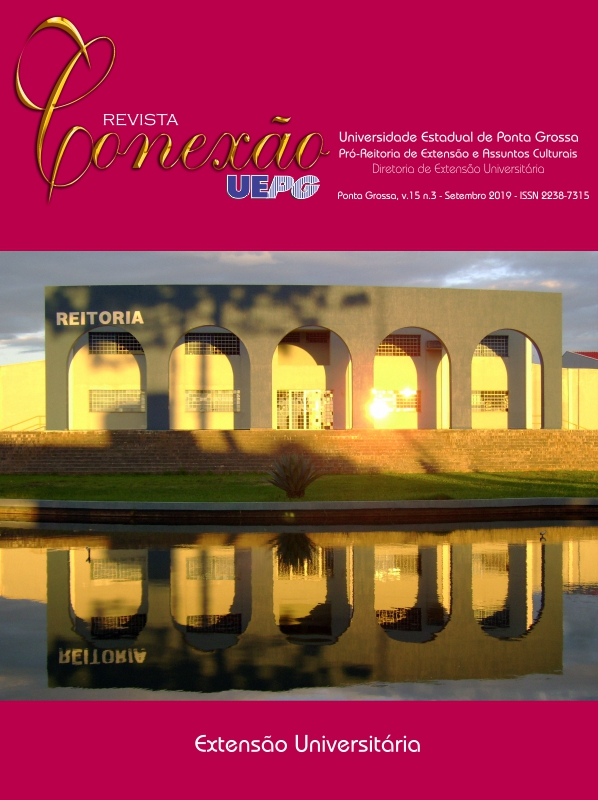FORMAÇÃO DE EXTENSIONISTAS: CONSTRUÇÃO COLETIVA DE PROJETO DE CURSO COM BASE NA INOVAÇÃO SOCIAL
DOI:
https://doi.org/10.5212/Rev.Conexao.v.15.i3.0011Schlagworte:
Extensão, Inovação Social, Cocriação, Institutos Federais.Abstract
Este artigo relata o processo de construção do projeto pedagógico de um curso voltado à formação de extensionistas. Tal projeto originou-se da necessidade de qualificar as atividades de extensão na Rede Federal de Educação; contribuir para a curricularização da extensão; promover o aprofundamento teórico da comunidade acadêmica nesta temática e capacitar os coordenadores de extensão. Para a elaboração do produto educacional proposto, desenvolveu-se uma pesquisa aplicada, de abordagem qualitativa, cujos procedimentos de coleta de dados envolveram pesquisa bibliográfica, documental, grupos focais (cocriações) e técnicas do Design Thinking. Como resultado, concebeu-se uma proposta de curso que visa contribuir para enriquecer a construção de conhecimentos relacionados à extensão, permitindo ao discente participante a execução de ações de extensão mais qualificadas e integradas ao ensino e à pesquisa.
Downloads
Literaturhinweise
BLEICHER, S. Processos flexíveis para a produção de materiais didáticos para a educação a distância: recomendações pautadas na perspectiva interdisciplinar. 2015. 384 p. Tese (Doutorado) - Universidade Federal de Santa Catarina, Centro Tecnológico, Programa de Pós-Graduação em Engenharia e Gestão do Conhecimento, Florianópolis, 2015. Disponível em: <http://www.bu.ufsc.br/teses/PEGC0399-T.pdf>. Acesso em: 20 fev. 2018.
BRANCO NETO, W. C. Elaboração de Projetos de Pesquisa e Extensão. Apostila do curso de Elaboração de projetos de pesquisa e extensão. Lages 2013.
BRASIL. Congresso Nacional. Lei nº 13.005, de junho de 2014. Aprova o Plano Nacional de Educação – PNE e dá outras providências. Disponível em: <http://www.planalto.gov.br/CCIVIL_03/_Ato2011-2014/2014/Lei/L13005.htm>. Acesso em: 17 abr. 2018.
CRESWELL, J. W. Projeto de Pesquisa: métodos qualitativo, quantitativo e misto. Trad. Magda Franca Lopes. 3. ed. Porto Alegre: Artmed, 2010.
DEMO, P. Pesquisa: princípio científico e educativo. São Paulo: Cortez, 2005.
FORPROEX, Fórum e Pró-Reitores de Extensão das Universidades Públicas Brasileiras. Política nacional de extensão universitária. Manaus, 2012. Disponível em: <https://www.ufmg.br/proex/renex/documentos/2012-07-13-Politica-Nacional-de-Extensao.pdf>. Acesso em: 28 fev. 2018.
IDEO. Design Kit. Disponível em: <http://www.designkit.org>. Acesso em: 12 jan. 2018.
JULIANI, D. P. et al. Inovação social: perspectivas e desafios. Revista Espacios, v. 35, n. 5, 2014.
JULIANI, D. P. Framework da Cultura Organizacional nas Universidades para a Inovação Social. 2015. 213 p. Tese (Doutorado em Engenharia e Gestão do Conhecimento) - Universidade Federal de Santa Catarina, Centro Tecnológico, Florianópolis, 2015. Disponível em: http://btd.egc.ufsc.br/wp-content/uploads/2015/05/Douglas-Paulesky-Juliani.pdf. Acesso em: 01 abr. 2018.
MULGAN, Geoff. The process of social innovation. Innovations, v. 1, n. 2, p. 145-162, 2006.
MURRAY, R.; CAULIER-GRICE, J.; MULGAN, G. The Open Book of Social Innovation. London, NESTA/The Young Foundation, 2010. Disponivel em: http://www.nesta.org.uk/publications/open-book-social-innovation. Acesso em: 12 dez. 2013.
VIANNA, M.; VIANN A, Y.; ADLER, I.; LUCENA, B.; RUSS O, B. Design Thinking. Inovação em negócios. 1. ed. Rio de Janeiro: MJV Press, 2011.
Downloads
Zusätzliche Dateien
- Figura 2 - Momento de interação durante a cocriação (Português (Brasil))
- Figura 1: Etapas da construção do curso de extensão. (Português (Brasil))
- Figura 3 - Registros de uma cocriação (Português (Brasil))
- Figura 4 - Módulos do curso (Português (Brasil))
- Figura 5 - Página Inicial do curso no ambiente virtual (Português (Brasil))
- Figura 6 - Captura de tela da webconferência do curso (Português (Brasil))
Veröffentlicht
Ausgabe
Rubrik
Lizenz
a) Os autores mantêm os direitos autorais e concedem à revista o direito de primeira publicação, com o trabalho simultaneamente licenciado sob a Creative Commons Attribution License que permite o compartilhamento do trabalho com reconhecimento da sua autoria e publicação inicial nesta revista.
b) Ao submeter um artigo à Revista Conexão UEPG e tê-lo aprovado os autores concordam em ceder, sem remuneração, os seguintes direitos à Revista: os direitos de primeira publicação e a permissão para que a Revista redistribua esse artigo e seus metadados aos serviços de indexação e referência que seus editores julguem apropriados.
c) Os leitores são livres para transferir, imprimir e utilizar os artigos publicados na Revista, desde que haja sempre menção explícita ao(s) autor (es) e à Revista Conexão UEPG e que não haja qualquer alteração no trabalho original. Qualquer outro uso dos textos precisa ser aprovado pelo(s) autor (es) e pela Revista.

Este obra está licenciado com uma Licença Creative Commons Atribuição 4.0 Internacional.





